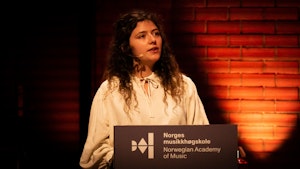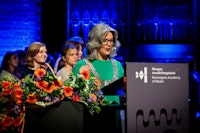Speak up about things that can make student life better! Join a committee and help shape your studies! It’s only when something reaches a decision-making body that action can be taken. Therein lies a responsibility even for students. Talk to the committees, play it into the system. That is what an institution is all about. So, don’t be afraid to speak up about what tomorrow’s musicians need!
Thanks for listening.
The English part of the speech as it was live in Lindemansalen
So let’s address the International students!
Welcome to Norway! You may have had many reasons for moving here. Maybe you found a particular teacher you really liked, or maybe the academy has a programme you couldn’t find anywhere else. Maybe you were just really tired of living with your mum, and like me, moved to the opposite side of Europe from your mother to start your studies. Maybe you even heard about the academy’s scandalous wind band that got kicked out of the children’s parade this year for being a security threat, and felt that this sounded like the ideal place for you. Whatever the reason - Moving to a new country can be equally as daunting as it is exciting. I hope your Norwegian classmates welcome you and help you out in navigating your way in a new country, a new city, a new language and our infamous social codes.
Norwegians are actually quite nice people once you get to know them. I think the most confusing thing about Norwegians is that the habits that we Norwegians have which may seem rude to you, are very often an attempt at being respectful. This is also why we often switch to English when you’re trying to speak Norwegian with us, usually because we want to be polite. I will urge you to berate us, to insist on speaking Norwegian just a little bit, when we do that, because the best way to learn a new language is by speaking, no matter how bad your grammar, pronunciation or syntax may be.
Settling into student life can be overwhelming, let alone in a new country. So, I would like to share something to have in the back of your minds while settling into Oslo. I remember that one of the first things my main teacher here at NMH told me was that first and foremost, I needed to feel well as a human being. It was only half a sentence, but it was a comment that was uttered in a vulnerable phase to me, as a new student in a big and daunting environment of brilliant pianists, and this comment had a huge impact on me for the entirety of my first year, and still does today. It allowed me to decide that sometimes, the best use of my Sunday was to take the train to the countryside and go for walks instead of sitting in the same practise room as I had done all week. I hope that you feel entitled to take care of yourself, to take the breaks you need, to go for all the walks you want, to take days off when you feel like it, and to feel homesick when you do. Lastly, One of the best things about moving to a new country is getting to know the culture. So don’t forget to live it! Take the time to do al the strange things Norwegians do, and I promise you that there are plenty! Like taking a quick skiing trip before your 9 a.m. class, participate in collectively running out of butter for months on end, and celebrate the local wind bands acting as the backbone of society in every town, village and neighbourhood.
Dear new students, I’ve taken up enough of your time. If you have managed to stay awake during this long speech, I hope that you all remember this - First and foremost, you have the right to feel well and content as a human being. Du skal ha det bra som menneske. Your musical expression can only grow from that. And now I wish you all a fulfilling and exciting academic year!




